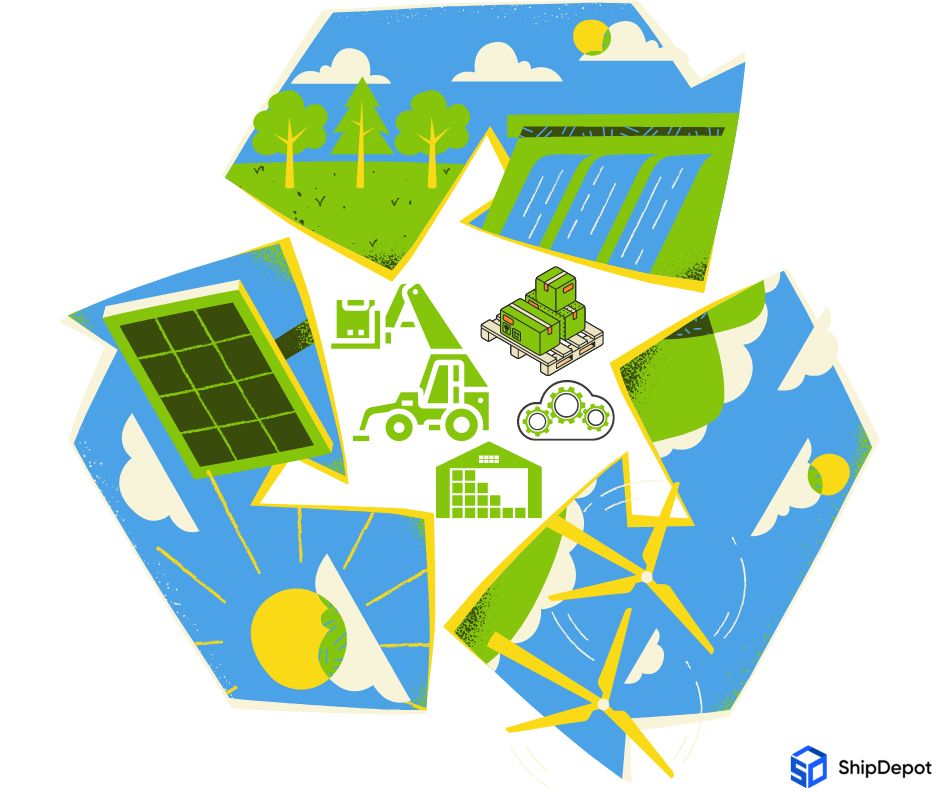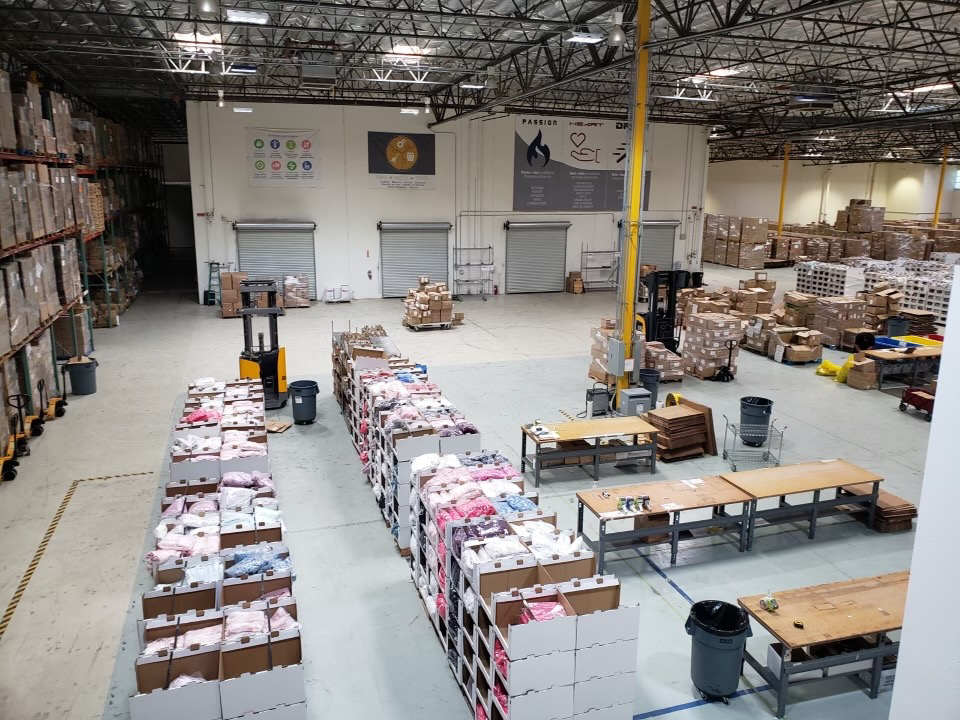As more companies adopt sustainable practices, third-party logistics (3PL) warehouses are also becoming more environmentally friendly. With the rise of eco-conscious consumers, companies must ensure their supply chains are sustainable, which includes working with environmentally responsible 3PL providers. We, at ShipDepot, believe that sustainability can help future society and empower environmentally conscious businesses and consumers. Continue to read on to see how 3PL warehouses are increasing their focus on sustainability, the benefits of doing so, and the challenges they face.
As the world becomes more environmentally conscious, businesses across all sectors are implementing sustainability initiatives. The logistics industry is no exception, with third-party logistics (3PL) warehouses taking steps to become more sustainable. These warehouses play a vital role in the supply chain, storing and distributing goods for businesses. By implementing green practices, 3PL warehouses can help reduce the carbon footprint of the logistics industry.
What is a 3PL Warehouse?
A third-party logistics (3PL) warehouse is a facility used by companies to outsource their logistics operations. These warehouses provide storage and distribution services, handling the movement of goods from the manufacturer to the end user. Companies that use 3PL warehouses can focus on their core business operations while outsourcing logistics to a specialist provider.
Why is Sustainability Important for 3PL Warehouses?
Sustainability is crucial for 3PL warehouses for several reasons.
Firstly, sustainable practices can help reduce the carbon footprint of the logistics industry. Transportation and logistics account for a significant portion of global greenhouse gas emissions, making it essential for the industry to take steps to reduce its impact on the environment.
Secondly, sustainability is becoming increasingly important for businesses that want to attract environmentally conscious consumers. Consumers are more likely to purchase products from companies that demonstrate a commitment to sustainability. By working with sustainable 3PL providers, businesses can ensure their supply chains are environmentally responsible.
Green Practices in 3PL Warehouses
There are several ways 3PL warehouses can become more sustainable. Here are some examples:
Energy-efficient Lighting
Switching to energy-efficient lighting is a simple yet effective way for warehouses to reduce their energy consumption. LED lights use less energy than traditional fluorescent bulbs and have a longer lifespan, making them more cost-effective in the long run.
Solar Panels
Installing solar panels on the roof of a warehouse can help reduce its reliance on grid electricity. The energy generated by the panels can be used to power lighting and other electrical equipment in the warehouse.
Recycling Programs
Implementing a recycling program can help reduce waste and promote sustainability. Warehouses can set up recycling stations for cardboard, plastics, and other materials, ensuring that waste is disposed of responsibly.
Electric and Hybrid Forklifts
Replacing traditional gas-powered forklifts with electric or hybrid models can help reduce emissions in the warehouse. These forklifts produce zero emissions and are quieter than their gas-powered counterparts.
Sustainable Packaging
Using sustainable packaging materials can help reduce waste and promote sustainability. Biodegradable materials, such as plant-based plastics, can be used in place of traditional materials like Styrofoam.
Benefits of Sustainable 3PL Warehouses
In addition to reducing the environmental impact of logistics operations, there are several other benefits to implementing sustainable practices in 3PL warehouses:
Cost Savings
Implementing sustainable practices can lead to cost savings for warehouses. For example, installing solar panels can reduce energy costs, while recycling programs can reduce waste disposal costs.
Positive Public Image
Working with sustainable 3PL providers can help businesses enhance their public image. Consumers are more likely to purchase products from companies that demonstrate a commitment to sustainability, which can help drive sales.
Compliance with Regulations
Sustainability regulations are becoming more prevalent, and businesses that do not comply may face penalties. Working with sustainable 3PL providers can help businesses meet regulatory requirements and avoid costly fines.
Challenges in Implementing Sustainable Practices
While there are many benefits to implementing sustainable practices in 3PL warehouses, there are also several challenges:
Capital Investments
Implementing sustainable practices often requires significant capital investments. For example, installing solar panels or purchasing electric forklifts can be expensive. Small warehouses may struggle to find the resources to make these investments.
Lack of Awareness
Some businesses may not be aware of the benefits of sustainable practices, or they may not know how to implement them. Educating businesses about the advantages of sustainability and guiding how to implement sustainable practices can help overcome this challenge.
Resistance to Change
Implementing sustainable practices may require changes to existing processes and workflows, which can be met with resistance from employees. Proper training and communication can help address this challenge.
***Businesses can overcome the challenges of implementing sustainable practices in 3PL warehouses by educating themselves about the benefits of sustainability, providing guidance on how to implement sustainable practices, and addressing resistance to change through proper training and communication.
Wrapping up
Sustainability is becoming increasingly important in the logistics industry, and 3PL warehouses are no exception. By implementing sustainable practices, 3PL warehouses can help reduce the environmental impact of logistics operations while providing benefits such as cost savings and a positive public image. However, there are challenges to implementing sustainable practices, including capital investments and resistance to change.
FAQs
- What is a 3PL warehouse, and why are they important?
- A 3PL warehouse is a facility used by companies to outsource their logistics operations. They are important because they provide storage and distribution services, handling the movement of goods from the manufacturer to the end user.
- What are some examples of sustainable practices in 3PL warehouses?
- Examples of sustainable practices in 3PL warehouses include energy-efficient lighting, solar panels, recycling programs, electric and hybrid forklifts, and sustainable packaging.
- What are the benefits of implementing sustainable practices in 3PL warehouses?
- The benefits of implementing sustainable practices in 3PL warehouses include cost savings, a positive public image, and compliance with regulations.
- What are some challenges to implementing sustainable practices in 3PL warehouses?
- Challenges to implementing sustainable practices in 3PL warehouses include capital investments, lack of awareness, and resistance to change.
- How can businesses overcome the challenges of implementing sustainable practices in 3PL warehouses?
- Businesses can overcome the challenges of implementing sustainable practices in 3PL warehouses by educating themselves about the benefits of sustainability, providing guidance on how to implement sustainable practices, and addressing resistance to change through proper training and communication.


